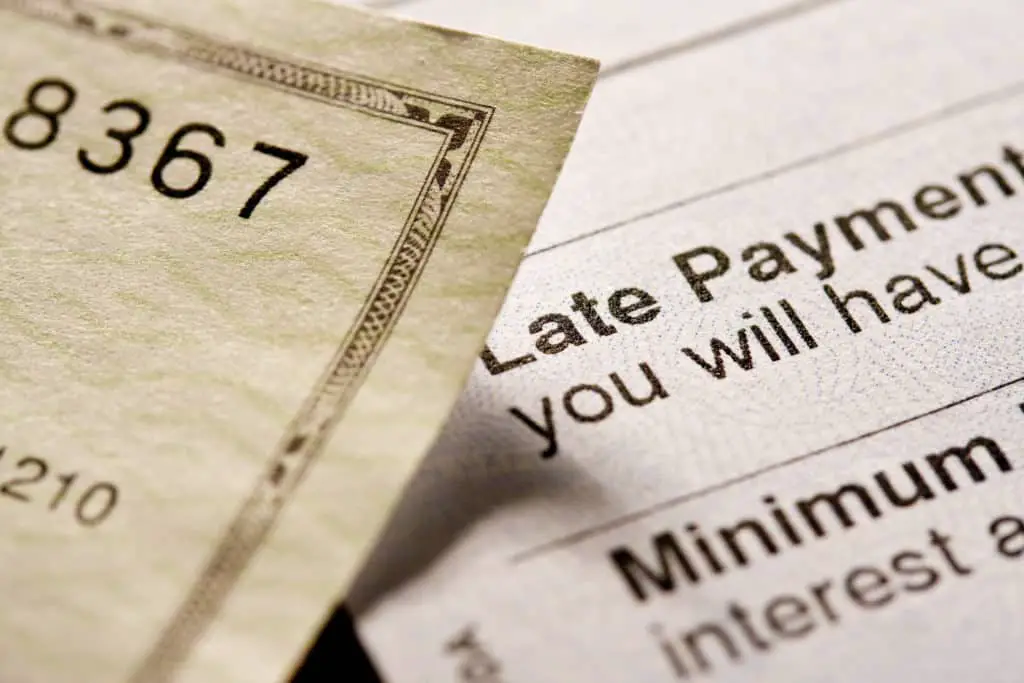
The most common problem a landlord is going to have with his tenants is around the issue of non-payment. The only way you are not going to have to deal with the issue of late payments is if you don’t have tenants at all.
Late payments are a huge issue for landlords. It creates undue stress around running the business, and there are always questions about when to collect, how to collect, and how strict should they be with the tenant.
The landlord has his own cash flow estimated for the year and requires on-time rent to be able to pay the taxes and insurance and mortgage that allows for the apartment complex to exist in the first place. Without knowing how much money you are going to collect for the year, it is impossible to plan for anything.
Landlords also need to keep in mind that while they want to receive their rent payments, and on time so they can pay their own bills, what is it going to cost them if they end up pushing the tenants out because they pester them about their rent payments every month.
How strict is too strict?
While technically, the tenant should be paying their rent on time each and every month because you are providing them with housing on time each and every month, unfortunately, the world never seems to operate that simply or fairly.
It’s important to know how to deal with the situation of late-paying renter, how to go about handling the situation, how to speak to the tenant, and how sometimes helping the tenant can also be helping yourself.
Be Prepared
You need to know that if you are renting to anyone you are going to come up against the issue of late payment. This is tough for landlords, especially from a psychological perspective. As a landlord, you are already providing goods and services to someone.
If they choose not to pay you on time, they are still using your housing, but you are not able to use what they agreed upon giving you when they signed the lease.
This aspect of late payment is what causes landlords so much grief. They have upheld and provided for their end of the contract, while not receiving the other half from the tenant, and sometimes, this can seem personal.
Simply knowing that this is how you as a landlord are going to feel, shorted and slighted, is going to help in dealing with this issue on an emotional level. Becoming angry and growing gray hairs never put a single dollar into anyone’s bank account.
Instead, realize that this is going to happen, and formulate a plan on how to both deal with the situation when it arises and take the steps to help prevent the chances of this situation coming up in the first place.
If you are not good at handling the situation when it arises, a plan is absolutely essential to have in place. Whatever letters or phone calls you need to make, ensure that you have the script written out as a procedure you can use every time. Winging tough, potentially emotional conversations is a good way to lose your cool, and turn the conversation into an emotionally charged conversation instead of a calm, collected, professional call.
If needed, hire someone that is good at making these type of conversations and dealing with late payment and collections. Many times, landlords will simply use their manager to talk with their tenants about late rent, but in the cases of larger apartment complexes, sometimes they will hire an outside person that is a good negotiator and communicator to handle those situation where late payment is perhaps chronic or there is perhaps no payment at all.
Determine whether you want to take the time and energy to handle these situations personally, have the communicative and emotional skills to handle it, and who would objectively be the best person to handle these situations.

Include Late Fees In The Lease Agreement
The first step in formulating a plan to deal with late payments is to have everything outlined in the lease agreement. This means not only when the payments are due, but how the tenant can pay for them, and how much late payment fees are if they do not pay on time.
Different landlords handle late fees differently. It has become much easier with increasing technology and online banking and rent collection services to automatically put these late fees on the tenant’s rent.
This saves time and paperwork as everything is done and documented online and it completely removes the necessity of you having a personal interest in the situation.
For instance, Cozy is an online rent collecting tool that is 100% free to use for landlords to help them collect rent, do background and credit checks, and handles rental listings that can accomplish this task quickly and easily. Other resources like Cozy can be found with a simple Google search.
Inside these services, you can quickly and easily set how much late fees are going to be when they will be applied and it is as simple as that. Online rent collecting systems make it easier and more dependable for rent to be paid on time in a couple of different ways.
First, you have the benefit of having the tenant’s bank account or debit card directly linked to the rent collection program. The program then charges the tenant automatically, just like any other subscription service like Netflix or Hulu. The money is transferred directly from the tenant’s account and into the bank account of the landlord, taking all the personal aspects out of the equation.
Secondly, if there are insufficient funds in the account when the system attempts to charge the tenant for that month’s rent, the program automatically charges the tenant a preset amount. This amount usually is charged again if the tenant hasn’t paid within a week, or with more upscale apartment complexes, the fees can be charged daily.
Having the collection handled electronically takes all the emotion out of it. You can have the terms set up and laid out in the lease so there is no ambiguity about the situation when it comes to late payment.
The most important thing it does is puts a strong incentive on the tenant to pay their rent on time and make sure enough funds are in their account to cover their rent. Late fees can pile up in a hurry, and if the late fee payment schedule is put in the lease, they will be financially responsible for it.
Regardless of how you charge your tenant late fees and how you collect them, simply having that as a characteristic of the lease, and going over it with them when they come in to sign is going to dissuade a good percentage of tenants who could turn into chronic late-payers.
Get Great Tenants
The fact is, the more you screen your tenants, the more stable your rental income is going to be.
Tenants that have a higher risk profile with sketchy background checks and low credit scores have this for a reason. They tend to be more unstable both personally and professionally and pose a higher risk for landlords.
If possible, limit the amount of these bad apples you let into your complex by doing thorough background and credit checks. Not only will it be better for the stability of your own cash flow, the rest of your tenants will appreciate you setting the bar higher as well. Your current tenants also want stable neighbors as renters.
In performing the credit and background checks, make sure that you get proof of income and yearly gross income as well. A good rule of thumb is that the tenant should make no less than 40x the monthly rent for the apartment for their yearly income to safely be able to afford the unit.
If their income is not above this range, the first unforeseen expense could have them not paying you rent instead of another bill.
Don’t Accept Cash
Not accepting cash is a relatively new practice being implemented by apartment complexes. Some of this is due to the advent of being able to pay bills online and using direct deposit, which has benefits for both tenants and landlords.
Cash payments allow the tenant to do a couple of things.
First, it allows them to pay you on their schedule, not necessarily on the date assigned in the lease. Simply put, they are going to give you the cash when they are good and ready.
Many tenants that are struggling financially are going to insist that they pay you with cash so they can have the flexibility for this very reason. Hence, the slow shift towards electronic payment by landlords; it removes this possibility.
Second, if the tenant is paying in cash, that means that they must physically bring you the money and get a receipt. While it may seem uncaring and cold, it allows the tenants to give the landlord whatever story or excuse they have for not paying the full rent.
And because most people are caring, they are more likely to acquiesce to a personal plea for leniency than if written in a formal letter. Stopping cash payments avoids having to listen to any emotional pleas from the tenant, which can be stressful and can get old quickly.
Finally, it just frees up your time and energy at the business. Not having to wait around in person for 100 checks and bundles of cash to come in each month can free up a ton of time! Another reason why electronic payment is the way to go.
Follow Up
Always give your tenant the benefit of the doubt if they are late by a few days with their payment. No doubt, you know those tenants that are chronic non-payers who you are always having to pester. But for tenant who usually pays on time, give them the benefit of the doubt.
While some excuses may feel thin, we have all forgotten to pay a bill from time to time just because we forgot or got busy. Perhaps this is actually the circumstance here. Leave some room for flexibility if you can, it can go along way with goodwill towards your tenant.
Also, keep sending them notices. If you send your late notices out a week after the first of the month and they don’t respond within another week, feel free to send them another one or have you or your manager pick up the phone and give them a call.
Constant reminders to them about their late payment let the tenant know that you know about the situation and that you are staying on top of it and not just letting it slide. If you let it go for months on end, the tenant can feel that you are a pushover and you may have trouble collecting the rent on a monthly basis after that. Be firm, but not pushy.
Don’t Make Threats
Getting angry has never put a dollar in someone’s bank account, but it has given people gray hairs. There is no need to get angry. Chances are that they are not withholding payment because of some beef with you or the apartment complex, they are just having personal financial issues and you are the entity they are paying late.
Be courteous and professional. Let them know that you understand they are having trouble paying now, but that you expect them to fulfill their obligation that they signed in the lease agreement.
Remember, you want to get all of the money for rent. Set up a payment plan if you must which allows the tenant to pay the back rent over the period of several months. Make it as easy as possible for them to pay. You are in the business of providing housing in exchange for dollars, not in the business of being someone’s mother. Keep it professional and you will have a much higher chance of getting that monthly rent sooner rather than later.
Also, offer to waive the late fees on the first month they make a late payment. This shows goodwill and understanding that the tenant will appreciate. Almost none of their other creditors will show them this compassion, and for something so necessary.
Let them know that the due date for payment is a firm date and you expect them to pay on time from here on out, but that you will waive the late fee for them as a courtesy this time.
Be Firm But Fair
You need to be firm in your implementation and execution of the late-payment policy. Tenants talk to each other. If they hear that you are letting some tenants’ payments slide for whatever reason, you are going to have a major problem on your hands.
Remember, they signed the terms of agreement when they signed the lease. They know that they need to pay the complex a certain amount on a certain date. Simply enforce this in the most professional way possible.
Let them know in a template letter of when and what the amount is that is owed. Tell them where they can make the payment and the methods by which they can pay. Also, inform them of when you are going to start charging late fees for the late-payments and how much those are going to be.
If necessary, let them know of the other consequences of non-payment such as asking them to leave and reporting their non-payment to the credit bureau.
You may feel empathy and concern for a tenant that has a legitimate reason for not getting you the payment on time. That’s fine! Give them the benefit of the doubt and waive the late fees. But letting them know that you are staying on top of the situation is going to put emphasis on them getting you paid.

Listen To Your Tenant’s Reasons
There is a line between being an understanding, caring landlord, and being a pushover for every sob story that comes your way. Many times, the tenant is struggling getting you paid, and it simply makes them feel better emotionally to let you know what is going wrong in their world.
Most times, these types of explanations will end with: “I’ll get you paid within the week, is that OK?” You just need to hear them out first.
Now, chronic late-payers with a new flavor-of-the-month excuse is a different matter entirely. These tenants are simply using your ear and your emotional pliability to see how far they can stretch the payment out. With these tenants, you need a much firmer hand, and sometimes the promise of an eviction notice to ensure on-time payments.
But listening to a tenant is something that you are going to have to get good at doing because just like late payments, it is something that is going to happen.
Know where to draw the line between empathy and being a pushover and you will be able to strike that balance you need to see your rent money come in while still being a courteous and caring landlord.
Take Legal Action
The final straw.
Again, chances are, if you haven’t had to evict someone for non-payment, you probably don’t own apartments. It’s just the nature of the beast. Therefore it is so important to implement the steps above before it gets to this point.
However, if it does get to this point, you need to take action. There is a certain tipping point where you can pretty much assume that the late payment is never going to come in and the tenant is going to keep on living in the unit until you take legal action.
This can take months depending on which state you live in and can cost you thousands of dollars in uncollected rent and legal fees.
Before it gets to this point, send them a Notice To Quit in the mail. This will inform them that due to their non-payment, the apartment complex is asking them nicely to leave. If they do not respond to that, more than likely you are going to have to go to court to get them physically removed from the property.
Again, it can take weeks to get a court date for this, and then the court is going to give the tenant a certain amount of days afterward to vacate the premise even if the judge rules in your favor.
Chronic late-paying tenants can also fall into the category of receiving a notice to quit. Having a tenant that is constantly not paying on time is a red flag that their financial stability is not very sound, which is a big risk to the landlord. Too often, chronic late payment turns into non-payment completely. Try to stop this before it becomes a real problem.
If a few warnings and written notices to the tenant do not rectify the situation, you are within your rights to ask them to leave. Just make sure that you have documentation in place for both the number of times you contacted them and their dates of payment and non-payment.
But remember, an eviction notice, whether it is from you or from the court, is the last resort. It costs a lot of money to flip an apartment. From the loss of rent to cleaning to repairs, to marketing and filling the unit again, the costs are going to range into the thousands of dollars even for the simplest apartment. Do everything you can to avoid getting to this point.
As a small, or large, business owner, you need to be able to predict your income for the month and for the year. You have expenses just like the rest of the world and knowing how much money is going to be coming in during a specific period of time is crucial to being able to plan for improvements, unexpected expenses, and just your normal bills and expenses.
Creating a plan to limit the late payments you get from tenants is a way that you can shore up that income and make it more predictable. Making that plan is essential because it will happen. You need to be prepared for it.
Make sure all the terms of payment, including the method, the date due, and any late fees are laid out in the lease agreement and gone over when the tenant comes into sign.
This makes the rental payment a business transaction and not a personal request for money and staying professional is super important to be able to have a productive conversation with your tenants.
Try to encourage tenants to pay through direct deposit through their bank, or at least by their credit or debit card through an online system. This way the money can be charged automatically per month just like any other subscription service. This can be a massive step in making sure monthly payments come in on time.
See if you can get away from accepting cash payments at all. Not only is this a time-consuming process, it allows the tenant to pay whenever they want to pay. It also allows them to give you excuses and an emotional plea for why they are unable to pay.
And while it is always a good idea to listen to your clients and be courteous and empathetic, for the sake of your business, you cannot allow yourself to be talked into letting payments or the payment date slide.
Be firm and implement your plan. A professionally implemented plan takes the emotions out of the situation, lets the tenant know that you are serious about the lease agreement and collecting the rent, and doesn’t set a precedent at your complex that late payments are acceptable.
